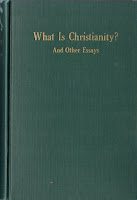[2024-05-11: updated links to German and Latin Triglotta Concordias below]
Up until now, my only online source for all things "Lutheran Confessions" or "Book of Concord" was
BookOfConcord.org sponsored by the LC-MS. The searchable text, the parsed and hyperlinked paragraphs, the links to sources, etc. have been of immeasurable benefit. I have stated
elsewhere that I consider it the main online source for all things related to the "Lutheran Confessions"… and it is
freely available. Truly the one who did the work (Norm Fisher?) of preparing all the digital material for this website has done a great service for the Church. Unfortunately this site's
doctrinal article that states
"Scripture is authoritative, according to our Confessions, not because it contains and proclaims the Gospel – the Gospel is proclaimed in many writings – but because it is God's Word"
is clearly no longer applicable to today's teachers of the LC-MS who say the Bible is a "plastic text" and is not of divine origin but divine-
human origin.
However, it has come to my attention (perhaps others may already be aware of this… I wasn't) that the
complete printed
Concordia Triglotta was made available by
Google Books (
and HathiTrust - full view) as of
January 6, 2017 ("Digitized
Jan 6, 2017"). What a wonderful celebration of the 500th Anniversary of Martin Luther's Reformation by… Google Books, HathiTrust, and the library of the University of California! Thank You! (oh,… hmmmm)
I suppose someone from Concordia Publishing House (Paul McCain?) or Concordia Historical Institute or even Northwestern Publishing House (NPH) could inform us: just when did CPH quit selling their 1921 Jubilee edition?
WorldCat shows that in 1955 Mott Press produced "An exact reprint of the original
Concordia Triglotta, published in 1921." And why was it that Mott Press and Northwestern (1988 & 1999),
not Concordia Publishing, picked up these "exact reprints"? Just why was it that the 1921 edition, which was the old (German) Missouri Synod's tribute to the
400th Anniversary of the Reformation,
discarded? Could it be that the "confessional Lutherans" of the LC-MS did not care for their 400th Anniversary? These questions come to mind:
- Do today's "confessional Lutheran" teachers of the LC-MS really care about the 500th Anniversary?
- Should we care about their "celebration" like they care about old Missouri's 400th Anniversary celebration?
So all my future hyperlinking of old (German) Missouri writings which refer to the
Book of Concord, or the
Müller edition or the
Concordia Triglotta ("
Trigl.") will now include links to this copy by
Google Books. Anyone (all LC-MS teachers?) using the
Tappert edition or
Kolb/Wengert edition or
McCain's Reader's Edition (which are
not publicly available online) will have to figure out their own cross-references. I am content to know the Lutheran Confessions from
old Missouri! (Isn't the Internet wonderful?)
Latin and German versions
For those wanting to research the original languages of Latin and German, the situation is irregular, a "
mixed bag". Although Google Books and HathiTrust properly OCR'd the Latin and English texts, unfortunately neither processed the printed
German text in fraktur font. However, the German text is
available online at the BookOfConcord site (searchable but not parsed by paragraph), and as a
downloadable scanned image (not searchable). The Latin version is searchable at
Google Books, but not at
BookOfConcord.org since it is only available as a scanned PDF image file and therefore not available to cite by section or paragraph – an oversight?
I obtained the digital text documents for
German only and
Latin only versions some years ago, probably from a Northwestern Publishing House CD digital product. The following language is inserted at various intervals in their text:
“Lutheran Church. Missouri Synod. (1997). Concordia Triglotta - German : The Symbolical books of the Evangelical Lutheran Church. Includes indexes. (electronic ed.) (:). Milwaukee WI: Northwestern Publishing House.”
A current search of the NPH website shows no indication that they are selling this any longer, so they appear to have divested themselves completely from all things "
Concordia Triglotta". — I wonder that the text of these files was extracted by the webmaster of
BookOfConcord.org (Norm Fisher?). Anyway, call me reckless, but I am going to make these digital documents freely downloadable here:
Note: if someone (i.e. CPH or NPH) wants to complain of copyright issues, I will remove the above links. I am making these files available because the content is
already freely available from (1)
BookOfConcord.org and (2) Google Books, now in this year of the 500th Anniversary of Luther's Reformation,
2017. Yes, I will celebrate this, just like the old (German) Missouri Synod did 100 years ago with their Quadricentenary Jubilee, I will celebrate this edition for the
- - - - - - - - - - - - - - - - - - - - - -
To further celebrate this unveiling by Google Books, I want to highlight just one small portion which had a big impact – a Reformation. It has to do with the doctrine that started my research leading up to the above discovery: Franz Pieper's teaching on "
sola fide" or the teaching of "by faith
alone" – in my next
Part 2a.
- - - - - - - - - - - - - Table of Contents - - - - - - - - - - - - - -
Part 1 - this blog post
Part 2a - Lutheran shibboleth:
SOLA fide– Luther &
Triglotta (and
Catholic Encyclopedia)
Part 2b - Warfare against
SOLA fide
Part 2c - Lutheran confusion of
SOLA fide?… not
Triglotta!
Part 3 -
Triglotta– difficult, impossible, not serious? OR Great work! Golden! (Scaer/LC-MS)








